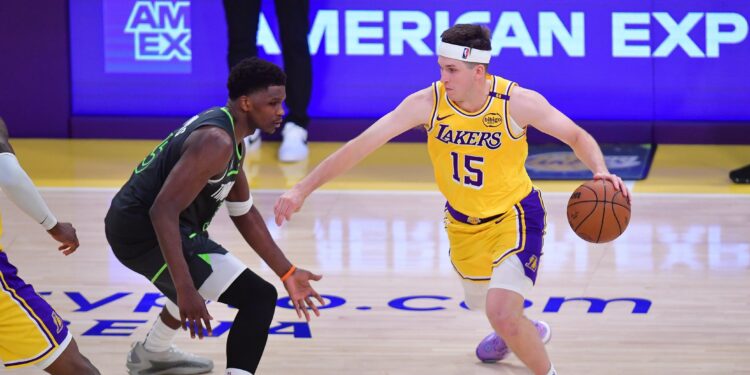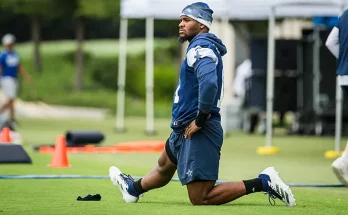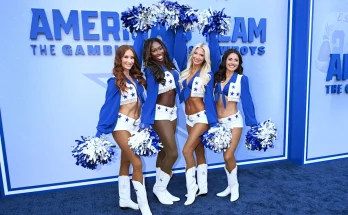Austin Reaves has rapidly evolved from an undrafted afterthought into one of the most intriguing trade chips in the NBA. As the Los Angeles Lakers prepare for yet another critical offseason, trade rumors surrounding the 26-year-old guard have ignited across social media and sports talk shows. With the team reportedly eyeing a defensive overhaul and hungry for a deeper playoff run, the question facing Lakers brass is simple but weighty: is Austin Reaves part of the solution—or the price of one?
Reaves averaged 20.2 points, 5.8 assists, and shot over 39% from three-point range this past season. On paper, that’s the profile of a player you build around. But for a Lakers franchise still anchored by LeBron James and the newly acquired Luka Dončić, priorities are shifting. In the wake of a disappointing postseason exit, largely attributed to defensive lapses and an undersized frontcourt, the Lakers are rumored to be shopping for rim protection, elite perimeter defenders, and versatile forwards who can complement their two stars. In this calculus, Reaves—despite his popularity and production—has emerged as a valuable bargaining chip, not an untouchable cornerstone.
The notion of trading Reaves might have seemed unthinkable just a year ago. After an impressive 2022–23 campaign and a standout showing with Team USA, Reaves re-signed with the Lakers on a four-year, $53.8 million deal—a massive bargain by today’s standards. At that time, the Lakers publicly emphasized their desire to keep Reaves for the long term. However, basketball is fluid, and circumstances evolve quickly. The addition of Luka Dončić during the 2024 trade deadline fundamentally changed the structure and needs of the team. Pairing two high-usage stars in LeBron and Luka created a glut of ball handlers and increased the need for elite defenders and floor spacers. Reaves, while capable of playing off the ball, is best used with the rock in his hands, creating secondary offense and navigating pick-and-rolls. In his current role, he risks being underutilized.
The team’s playoff performance magnified their weaknesses, particularly on defense. Against the Minnesota Timberwolves in the first round, Rudy Gobert dominated the interior, and the Lakers struggled to contain perimeter threats. Reaves, though a willing defender, doesn’t have the length or elite athleticism to lock down top guards or wings. It’s not an indictment of his skill—Reaves is one of the most cerebral young players in the league—but his strengths are more offensive than defensive. This has sparked internal debate in the Lakers’ front office about whether his trade value might better serve the team than his presence on the court.
Multiple reports suggest that the Lakers are exploring deals with teams looking to offload defensive talent in exchange for scoring and playmaking. The Utah Jazz have emerged as a potential partner, with a proposed deal involving Collin Sexton and Walker Kessler. Sexton, a dynamic guard with a scorer’s mentality, would fill Reaves’ offensive shoes, while Kessler would bring much-needed shot-blocking and rebounding. The deal would likely require Los Angeles to include other assets such as Jarred Vanderbilt or draft compensation, but the central figure remains Reaves. From a financial standpoint, both Sexton and Kessler are on manageable contracts, and the Lakers would retain flexibility moving forward.
Another potential trade scenario involves the Boston Celtics and Marcus Smart. Smart, a former Defensive Player of the Year, is the archetypal defender the Lakers crave. He brings playoff experience, vocal leadership, and the kind of defensive intensity that can shift the identity of a team. Acquiring Smart, however, would signal a clear pivot toward defense-first basketball and would likely come at the cost of offensive fluidity. Additionally, Smart is owed nearly $20 million annually for the next three seasons—a heavier financial burden than Reaves’ current deal.
Meanwhile, Portland has floated names like Jerami Grant and Matisse Thybulle, two forwards known for their length and defensive versatility. Grant brings scoring and positional flexibility, while Thybulle is a perimeter pest who can defend three positions. Adding both players could instantly raise the Lakers’ defensive floor. Reaves would be the centerpiece going to Portland, possibly alongside Hachimura or a future pick. For the Lakers, this would be a chance to reshape their rotation around size and switchability, aligning with Coach J.J. Redick’s stated desire to build a team that can defend elite wing-heavy opponents.
Still, the Lakers are aware of the risks. Trading Reaves for a collection of role players only makes sense if it pushes them into immediate contention. Anything less, and the move could be remembered as another ill-fated decision, akin to past departures like Alex Caruso or Brandon Ingram. Reaves is still young, improving, and capable of serving as a bridge into the post-LeBron era. Some in the organization see him as a potential third star, especially if Luka and LeBron dominate the ball-handling duties. Others view him as a luxury that the team can’t afford when glaring needs exist elsewhere.
The fan base is similarly divided. Social media threads and Lakers forums are ablaze with arguments both for and against trading Reaves. Supporters of a trade point to his playoff performance—solid, but not game-changing—and argue that he lacks the elite athleticism to become a true two-way force. They contend that maximizing LeBron’s final years requires sacrificing future potential for present necessity. Opponents argue that Reaves represents exactly the kind of player the Lakers need more of: high IQ, unselfish, and capable of thriving in big moments. They see trading him as another case of short-sighted decision-making.
Reaves himself has remained grounded amid the speculation. Speaking from his Arkansas hometown during a charity event, he said, “I want to play my whole career in L.A., but I understand this is a business. I don’t control that side of it.” His response was measured, even mature, signaling that while he would prefer to stay, he knows that his future isn’t entirely in his hands. Sources close to Reaves say he’s focused on improving his defense this summer and wants to come back stronger, regardless of the jersey he’s wearing.
From a financial angle, there are additional layers to consider. While Reaves’ current contract is team-friendly, he holds a player option after the 2025–26 season. If his upward trajectory continues, he could command upwards of $25–30 million annually on the open market. The Lakers, already paying top dollar for LeBron and Luka, may be unwilling to commit that kind of money to a player who may not be in their closing lineup during critical games. Moving him now, while his value is high, could be a proactive cap management strategy.
Adding to the intrigue are whispers of even bigger blockbuster possibilities. Names like Jaren Jackson Jr., Mitchell Robinson, and even Donovan Mitchell have circulated in front-office circles. These are speculative scenarios that would require more than just Reaves to get done, but his inclusion makes such deals more plausible. Jackson Jr., in particular, is a tantalizing target: a legitimate rim protector who can stretch the floor. Pairing him with Anthony Davis would give the Lakers the kind of frontcourt versatility that wins playoff series. The price would be steep, but championship windows are short, and bold moves often define legacies.
As the NBA Draft and free agency approach, the Lakers find themselves at a crossroads. The decisions made in the next few weeks could shape the franchise for years to come. Keep Reaves and continue building around the current core, or cash in now and construct a roster designed to win immediately? There are no easy answers. The Lakers’ history is littered with high-stakes gambles—some that paid off handsomely, others that backfired spectacularly.
What’s certain is that Reaves’ name will continue to surface in trade discussions, and the pressure on the front office to deliver a competitive roster will only intensify. LeBron James isn’t getting younger, and the Luka experiment must yield results quickly. The franchise can’t afford another season of early exits and unmet expectations. Whether Austin Reaves is part of that solution—or becomes the cost of pursuing it—will be one of the most consequential storylines of the summer.
For now, Lakers fans will wait and wonder, hoping their team makes the right call. Reaves may just be the key to unlocking their championship puzzle, either as a core piece or the trade chip that brings the final one. Either way, his presence will shape the future in Los Angeles, long after the rumors have faded.



